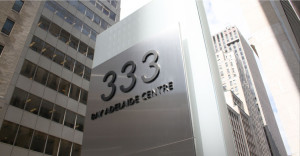 Financial risk management is a stimulating and worthwhile livelihood, according to four panellists who convened on May 14, 2014, to describe their careers in the industry. A rainy afternoon did not discourage an audience of about sixty risk professionals and students from attending the meeting of the Toronto Chapter of the Global Association of Risk Professionals which was held in the new KPMG offices on Bay Street.
Financial risk management is a stimulating and worthwhile livelihood, according to four panellists who convened on May 14, 2014, to describe their careers in the industry. A rainy afternoon did not discourage an audience of about sixty risk professionals and students from attending the meeting of the Toronto Chapter of the Global Association of Risk Professionals which was held in the new KPMG offices on Bay Street.
Xiaobo Wang, Director of Credit Risk Audit at Scotiabank, acted as the evening’s moderator. He posed several questions to four panellists: the nature of their work, what is a “typical day,” and how they obtained their positions, and advice they would give to new entrants in their career path. Afterward, he encouraged questions from the audience to the panellists.
Standing Under the Mouth of a Funnel
“My day is like standing under the mouth of a funnel,” said the first panellist, a vice president at a big Canadian bank. With new deals constantly appearing that need to be adjudicated, she said her day was not really under her control. “It’s a juggling act,” in terms of what meets priorities. She noted that revenue generation is important, but she also had to pay attention to “where we are going, in the grand scheme of things.”
It’s important to know who you are working for, said the first panellist, and her boss is ultimately the shareholder. Whether it’s a two million dollar deal or a syndication of half a billion, “we have to consider carefully why the deal is coming to us” to carry out a good adjudication.
The first panellist said that improved IT infrastructure meant “more information is now available to us,” which was helpful to the adjudication team.
Nor is her work just adjudication. There is much behind-the-scenes work done in approving, maintaining, monitoring, and adjusting limits. Over the years, some hotly discussed topics include concentration risk, overall limits, and what kind of risk/reward profile the bank is aiming at. Her career spans 25 years at the same bank.
She first began in underwriting, and specialized in a succession of areas: real estate, corporate lending, and cable financing. She advised aspiring risk managers, to “keep moving” because “any time you move you become the expert in that area” and this will be great for the team because there will be a diversified background for decision making.
The first panellist had a strongly career-affirming experience early on. “Someone senior gave me a vision of who I could be, and said ‘YOU will be doing this some day.’ I can still remember where and when we had the conversation.” ª
Stay Positive and Open to New Opportunities
Jean Wills, Senior Analyst, Trading Credit Risk, Reporting and Analysis at CIBC, worked three years as an Audit Manager at CIBC before moving to her current group. “Audit is a very good place to start” when joining a bank, she said, because it gives an overview of the organization. Wills, who originally trained as an engineer, also has credentials in education and an MBA from Schulich, and has lectured in finance at both Schulich School of Business and Ryerson University.
Much of Wills’s day-to-day work depends on working with MS Excel spreadsheets, SQL queries, and knowledge of Basel rules and RWA models for the business lines. But Jean also works with clients to make sure the final reports are what the clients want. Her team also works on Quantitative Impact Studies (“QIS”) as per Basel and OSFI.
Her day is relatively predictable because it involves running queries on data for about forty credit risk reports that go out on a monthly or quarterly basis, said Wills. She also works with credit adjudication, limit monitoring, and data input teams.
A looming issue for all banks is Risk Data Aggregation, which is a new requirement for Basel III, coming into effect by the end of 2016. Wills is the representative for her group on this implementation.
She advised new risk managers to “stay positive and open to new opportunities.” She recommended Women in Capital Markets for its strong mentorship program. “Don’t be afraid to turn to others for advice and support.” ª
He Tortures Numbers Until They Confess
“I torture numbers for a living,” joked the third panellist, a vice president at a big Canadian bank. He completed a Masters in Finance in London and started with a large global bank in the Middle East.
The third panellist has spent 11 years with his current bank. Much of his time currently revolves around credit risk and operational risk models—in other words, “heavy duty analytical work.” He said, “when I first joined, Basel II had just hit us. The time was a blur.” Although it was a challenging time for banks, “we migrated along with it,” and opportunities became available.
He said those seeking a career in financial risk management should ideally “find an optimal match between what you’re good at and what the position needs.” ª
She Understands the Numbers
“He tortures the numbers… but I try to understand them,” joked Echo Han, Manager, Portfolio Management and Data Analytics, Policy and Portfolio Management at Bank of Montreal. She entered finance from a background in computer science. She mainly focuses on data analysis for the portfolio management team.
Han said that she got into her area as a combination of “a lot of education and networking and some luck.” The skills that she has in computer science and programming are useful to the portfolio management team every day. These will be supplemented by the finance education she is working hard to acquire (both CFA and MBA designations) in the near future.
As the youngest panellist, Han said she felt close to the students in the audience because she had so recently gone through what they are facing now. It may feel difficult but “I had to put myself out there to get myself known in the community.”
Her empathy for the inexperienced members at the evening’s networking event was evident. ª



